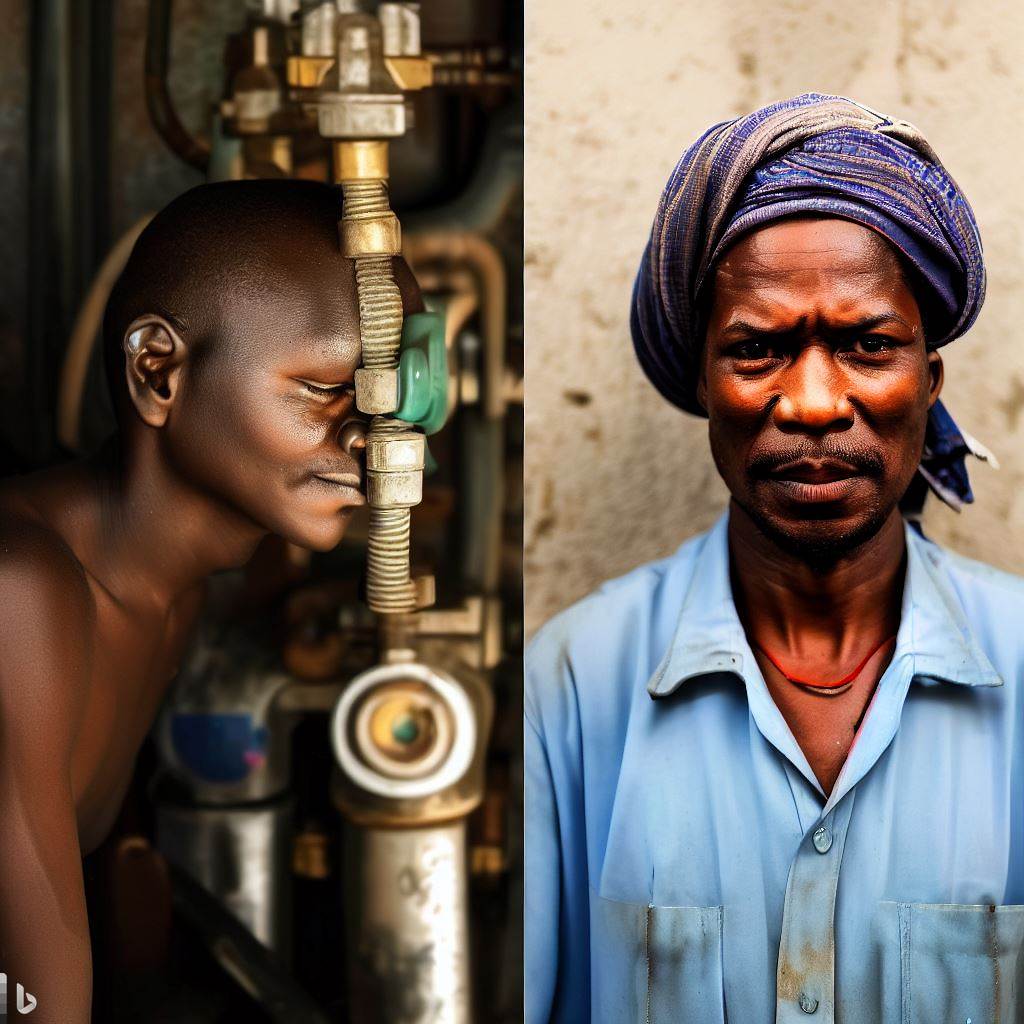Introduction
Plumbing practices play a crucial role in the overall development and functionality of a country like Nigeria.
This blog section aims to explore the differences between local and international plumbing practices in Nigeria.
By understanding these disparities, we can gauge the impact they have on the country’s plumbing infrastructure and its relevance to the Nigerian society as a whole.
Explanation of the topic: Local vs. International Plumbing Practices in Nigeria
The comparison between local and international plumbing practices in Nigeria focuses on identifying the variations and disparities in techniques, materials, and standards utilized by local Nigerian plumbers as opposed to those practiced by international experts.
By evaluating these differences, we can assess the level of efficiency, safety, and quality that local plumbing practices offer and whether they align with international standards.
Overview of the importance of plumbing practices in the country
Plumbing practices are of paramount importance in Nigeria due to their impact on public health, sanitation, and the overall well-being of the population.
Proper plumbing installations and maintenance prevent the spread of waterborne diseases, ensure access to clean water, and promote hygiene practices.
Therefore, evaluating the disparities between local and international plumbing practices becomes crucial in addressing the country’s plumbing challenges and improving the overall quality of life for its citizens.
Background of Plumbing Practices in Nigeria
Brief history of plumbing in Nigeria
- Plumbing in Nigeria dates back to ancient times, when intricate water systems were built.
- During the colonial era, the British introduced modern plumbing systems to Nigeria.
- After gaining independence, Nigeria started developing its plumbing industry to meet local needs.
Traditional plumbing techniques used by local plumbers
- Local plumbers in Nigeria often rely on traditional techniques passed down through generations.
- They use materials like mud, bamboo, and cow dung to construct basic plumbing systems.
- Traditional methods include hand-dug wells, rainwater harvesting, and the use of earthen pots.
Challenges faced by local plumbers in terms of resources and knowledge
- Limited access to modern plumbing tools and equipment hinders local plumbers’ efficiency.
- Lack of proper training and education on modern plumbing techniques limits their knowledge.
- Limited availability of quality plumbing materials increases the risk of system failures.
List of challenges faced by local plumbers
- Inadequate funds to invest in modern plumbing equipment and tools.
- Insufficient exposure to training and workshops on advanced plumbing techniques.
- Limited access to reliable suppliers of quality plumbing materials.
- Difficulty in keeping up with evolving plumbing industry standards.
- Lack of awareness about the latest plumbing technology and innovations.
List of resources to support local plumbers
- Government initiatives to provide subsidies and loans for plumbing equipment.
- Collaboration with international organizations to offer training programs.
- Establishment of plumbing schools and vocational training centers across Nigeria.
- Encouraging partnerships with plumbing manufacturers to ensure the availability of quality materials.
- Creating online platforms to share knowledge and best practices among local plumbers.
In review, plumbing practices in Nigeria have a rich history but face challenges due to limited resources and knowledge.
Local plumbers rely on traditional techniques, but their efficiency could significantly improve with access to modern tools and training.
It is essential to invest in the plumbing industry’s growth to meet the increasing demand for efficient water systems in Nigeria.
Read: Museum Ethics for Curators: A Nigerian Perspective
Evolution of International Plumbing Practices in Nigeria
The Nigerian plumbing industry underwent a significant transformation influenced by international standards, introducing modern methods, materials, and technologies.
Traditional practices were replaced with advanced techniques and materials as globalization and international plumbing experts made their presence felt.
- International standards influenced Nigerian plumbing, replacing traditional methods.
- Globalization brought new materials and techniques to Nigeria’s plumbing industry.
- Modern practices boosted efficiency and effectiveness in plumbing systems.
- Standard plumbing codes, based on international standards, guided design and maintenance.
- Ensured Nigerian plumbing met global quality and safety standards.
- Modern materials like PVC and copper pipes replaced traditional options.
- These materials resist corrosion, leaks, and blockages, ensuring durability.
- Advanced technologies like trenchless plumbing and hydro jetting improved efficiency.
- Video inspection enhanced plumbing diagnostics and problem-solving.
- Trenchless plumbing minimized disruption, reducing costs and environmental impact.
- International practices upgraded local plumbers’ skills and knowledge.
- Nigerian plumbers now offer services on par with global experts.
- International plumbing practices spurred economic growth and foreign investments.
- Improved plumbing infrastructure attracted businesses to Nigeria.
- This transformation profoundly impacted the Nigerian plumbing industry, enhancing quality and fostering economic growth.
Read: Funding and Support for Curators in Nigeria Explored
Comparison of Local and International Plumbing Techniques
Examination of traditional plumbing methods used by local plumbers
Local plumbers in Nigeria have been using traditional plumbing methods for many years. These methods have been passed down through generations and are deeply rooted in the country’s culture and practices.
The techniques employed by local plumbers are often based on practicality, resource availability, and affordability.
One of the most common traditional methods used by local plumbers is the clay pot drainage system. This technique involves using clay pots to create a makeshift sewage system.
The pots are connected by pipes made from bamboo or clay, allowing wastewater to flow from one pot to another and eventually into a pit or an open drain.
Another traditional plumbing technique used by local plumbers is the use of galvanized iron pipes for water supply.
These pipes are readily available and relatively affordable, making them a popular choice among local communities.
In short, they are prone to rust and corrosion, which can affect the quality of the water supply.
Analysis of the effectiveness and efficiency of local techniques
While local plumbing techniques may have been effective in the past, they often lack the durability and reliability offered by modern international plumbing practices.
The use of clay pots and bamboo pipes, for example, can lead to frequent blockages and leakages, causing inconvenience and potential health hazards.
Basically, the reliance on galvanized iron pipes for water supply poses a risk of contamination due to rust and corrosion.
This can lead to waterborne diseases and other health issues, especially in areas with poor sanitation infrastructure.
Evaluation of international plumbing practices in terms of quality and durability
International plumbing practices, on the other hand, prioritize quality and durability. Modern materials such as PVC, copper, and stainless steel are commonly used in international plumbing systems.
These materials are corrosion-resistant, ensuring a longer lifespan for the plumbing infrastructure.
International plumbing practices also emphasize the importance of proper installation and maintenance.
Skilled professionals are trained to follow standardized procedures and adhere to safety regulations.
This ensures that the plumbing system functions optimally and reduces the risk of leaks, blockages, and other issues.
Generally, international plumbing practices emphasize the use of modern tools and equipment for accurate measurements, precise fittings, and efficient installations.
This results in a more efficient water supply and drainage system, reducing water wastage and maximizing water conservation efforts.
In essence, the comparison of local and international plumbing techniques in Nigeria reveals the need for improvement in traditional methods.
While local techniques may have cultural significance, they often lack the effectiveness and durability provided by modern international practices.
Local plumbers could benefit from adopting international standards and materials to enhance the quality and efficiency of their work.
This would ultimately contribute to better sanitation, improved water supply, and a healthier living environment for the Nigerian population.
Collaboration between local plumbers and international experts could lead to the development of hybrid techniques that incorporate the strengths of both approaches.
Read: Eco-Friendly Plumbing Practices in Nigeria: A Growing Trend

Challenges and Benefits of Local Plumbing Practices in Nigeria
In Nigeria, local plumbing practices have their unique set of challenges and benefits.
While there are limitations faced by local plumbers, their deep understanding of local conditions and their role in preserving cultural practices cannot be overlooked.
Challenges Faced by Local Plumbers
- Limited access to modern plumbing equipment and tools, making their work more difficult.
- Inadequate formal training and certification programs, leading to skill gaps among local plumbers.
- Lack of proper understanding of foreign plumbing technologies that are becoming more prevalent in Nigeria.
- Inefficient supply chain of plumbing materials, hindering access to quality products.
- Inconsistent government regulations and licensing standards, affecting the credibility of local plumbers.
Benefits of Local Plumbers’ Deep Understanding of Local Conditions
- Local plumbers have extensive knowledge of the climate and weather conditions in different regions of Nigeria.
- They understand the soil composition and its impact on plumbing systems, allowing them to provide appropriate solutions.
- Local plumbers know the common plumbing issues faced by Nigerian households and can quickly identify and fix them.
- Their understanding of common building techniques and materials enables them to work efficiently.
- They have established relationships with local suppliers, ensuring easier access to plumbing materials.
- Local plumbers are familiar with the cultural practices and preferences of the local population.
Preserving Cultural Practices through Local Plumbers
Local plumbers play a vital role in preserving cultural practices in Nigeria:
- They incorporate traditional elements in plumbing designs to maintain the aesthetic appeal of buildings.
- By using local materials, they ensure the continuity of traditional construction methods.
- Local plumbers integrate traditional values, such as water conservation practices, into their services.
- They educate clients about traditional plumbing practices, passing down knowledge from one generation to another.
- Local plumbers actively participate in community events, keeping cultural practices alive and relevant.
All in all, while local plumbing practices in Nigeria face limitations, they also offer significant benefits.
The deep understanding of local conditions enables local plumbers to tackle plumbing issues effectively.
Most importantly, their role in preserving cultural practices is invaluable, ensuring the continuity of traditional methods and values.
Read: The Evolution of Curatorial Practices in Nigeria
Advantages and Limitations of International Plumbing Practices in Nigeria
International plumbing practices have brought significant advantages to the Nigerian context, showcasing the potential for better water management and improved sanitation.
In short, there are also limitations and potential drawbacks that need to be considered in the implementation of these techniques.
Advantages
- Better Water Quality: International plumbing practices emphasize the use of advanced filtration systems, ensuring cleaner and safer water for consumption.
- Improved Efficiency: International techniques focus on water conservation methods and optimal plumbing designs, resulting in reduced water wastage in Nigeria.
- Enhanced Sanitation: By adopting international practices, Nigeria can implement better sanitary systems, reducing the risk of disease transmission and promoting public health.
- Innovative Technology: International plumbing practices often incorporate the latest technologies and materials, allowing Nigeria to benefit from modern advancements.
- International Standards: Implementing international practices helps align Nigeria’s plumbing systems with global standards, improving compatibility and integration.
Limitations
- Cultural Adaptation: International practices may not always align with cultural norms and preferences in Nigeria, requiring careful consideration and adaptation.
- Availability of Resources: Implementing international plumbing practices may require importing specialized equipment and materials, which can be challenging and costly.
- Skilled Workforce: Effective implementation of international techniques requires a skilled workforce trained in these practices, which may pose challenges in Nigeria.
- Maintenance and Expertise: International plumbing systems may require specialized maintenance and technical expertise, which might be scarce in Nigeria.
- Local Knowledge and Expertise: Nigerian plumbers possess valuable local knowledge that can be overlooked with an overemphasis on international practices.
Consideration of Cost Implications
While international plumbing practices offer promising advancements, it is crucial to consider the cost implications for Nigeria.
The initial investment in adopting international techniques, including equipment, training, and materials, can be substantial.
Essentially, ongoing maintenance and repairs might require the availability of specialized professionals, potentially adding to the cost burden.
Nevertheless, the long-term benefits of improved water quality, enhanced sanitation, and efficient water management can outweigh the initial costs, providing a healthier and more sustainable plumbing system for Nigeria.
Lastly, international plumbing practices bring numerous advantages to Nigeria, including improved water quality, enhanced efficiency, and better sanitation.
In a nutsell, it is essential to be aware of the limitations and potential drawbacks associated with these practices.
Careful consideration of cultural adaptation, availability of resources, skilled workforce, maintenance requirements, and cost implications is necessary to ensure the successful implementation of international plumbing practices in Nigeria.
The Future of Plumbing Practices in Nigeria
Plumbing practices in Nigeria have undergone significant changes over the years.
In this section, we will explore the potential integration of local and international practices, discuss the importance of training and education for plumbers, and forecast the potential advancements and improvements in plumbing practices in the country.
Exploration of the Potential Integration of Local and International Practices
Nigeria, like many other countries, has traditionally relied on local plumbing practices that have been passed down through generations.
These practices have been effective in meeting the basic plumbing needs of the population.
With globalization and the increasing influence of international standards, there is a need to explore the integration of local and international practices.
This integration can bring about improved efficiency, safety, and effectiveness in plumbing systems.
By combining the knowledge and expertise of local plumbers with the latest international techniques, Nigeria can benefit from a more comprehensive and sustainable plumbing industry.
Discussion on the Importance of Training and Education for Plumbers in Nigeria
One of the key factors in shaping the future of plumbing practices in Nigeria is the emphasis on training and education for plumbers.
Currently, there is a lack of standardized training programs for plumbers in the country.
By investing in training programs and providing access to quality education, Nigeria can ensure that its plumbers are equipped with the necessary skills and knowledge to meet the changing demands of the industry.
Training programs should focus on technical skills, safety protocols, and the latest advancements in plumbing technologies.
This will not only enhance the efficiency and effectiveness of plumbing practices but also promote professionalism and accountability among plumbers.
Forecasting the Potential Advancements and Improvements in Plumbing Practices
Looking into the future, there are several potential advancements and improvements that can be expected in plumbing practices in Nigeria.
- Adoption of eco-friendly plumbing practices: With the global focus on sustainability, Nigeria is likely to witness an increase in the adoption of eco-friendly plumbing practices.
This includes the use of water conservation techniques and energy-efficient plumbing systems. - Integration of smart technologies: The rise of smart technologies presents an opportunity for the integration of advanced plumbing systems in Nigeria.
Smart sensors, automated controls, and remote monitoring can enhance the efficiency and performance of plumbing installations. - Innovation in wastewater management: Proper wastewater management is crucial for public health and environmental sustainability.
Nigeria is expected to witness innovation in wastewater treatment and disposal systems to address the growing population and urbanization. - Improved safety standards: As the plumbing industry continues to evolve, there will be a greater emphasis on safety standards.
This includes proper documentation, adherence to building codes, and regular inspections to ensure the safety of plumbing systems. - Collaboration and knowledge sharing: The future of plumbing practices in Nigeria depends on collaboration and knowledge sharing among industry stakeholders.
This includes partnerships between local and international plumbing organizations, as well as the sharing of best practices and case studies.
Ultimately, the future of plumbing practices in Nigeria holds great potential.
By integrating local and international practices, investing in training and education, and embracing advancements and improvements, the plumbing industry in Nigeria can meet the evolving needs of its population and contribute to the overall development of the country.
Conclusion
Recap of the key points discussed
- Local plumbing practices in Nigeria rely heavily on traditional methods and materials.
- International plumbing practices in Nigeria use modern technology and standardized materials.
- A balanced approach to plumbing practices in Nigeria is necessary to ensure safety and efficiency.
Emphasis on the need for a balanced approach to plumbing practices in Nigeria
While local plumbing practices have cultural and historical significance, they often lack efficiency and safety standards.
On the other hand, international plumbing practices may overlook the unique challenges and needs of Nigerians.
Therefore, a balanced approach that incorporates the strengths of both local and international practices is crucial.
Final thoughts on the significance of the topic for the development of the plumbing industry in Nigeria:
This comparison of local and international plumbing practices highlights the importance of innovation and adaptation.
By combining traditional knowledge with modern techniques, Nigeria’s plumbing industry can evolve and meet international standards.
This will lead to safer and more efficient plumbing systems, benefiting both individuals and the Nigerian economy as a whole.




